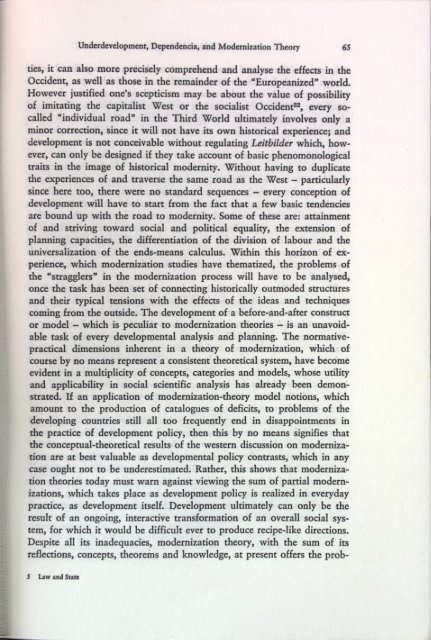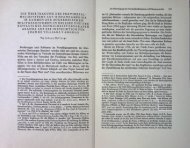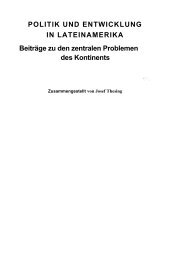9_Law and State_Volume 17
Create successful ePaper yourself
Turn your PDF publications into a flip-book with our unique Google optimized e-Paper software.
Underdevelopment, Dcpendencia, <strong>and</strong> Modernization Theory 65<br />
ties, it can also more precisely comprehend <strong>and</strong> analyse the effects in the<br />
Occident, as well as those in the remainder of the “Europeanized” world.<br />
However justified one’s scepticism may be about the value of possibility<br />
of imitating the capitalist West or the socialist Occident32, every socalled<br />
“individual road” in the Third World ultimately involves only a<br />
minor correction, since it will not have its own historical experience; <strong>and</strong><br />
development is not conceivable without regulating Leitbilder which, however,<br />
can only be designed if they take account of basic phenomonological<br />
traits in the image of historical modernity. Without having to duplicate<br />
the experiences of <strong>and</strong> traverse the same road as the West - particularly<br />
since here too, there were no st<strong>and</strong>ard sequences - every conception of<br />
development will have to start from the fact that a few basic tendencies<br />
are bound up with the road to modernity. Some of these are: attainment<br />
of <strong>and</strong> striving toward social <strong>and</strong> political equality, the extension of<br />
planning capacities, the differentiation of the division of labour <strong>and</strong> the<br />
universalization of the ends-means calculus. Within this horizon of experience,<br />
which modernization studies have thematized, the problems of<br />
the “stragglers” in the modernization process will have to be analysed,<br />
once the task has been set of connecting historically outmoded structures<br />
<strong>and</strong> their typical tensions with the effects of the ideas <strong>and</strong> techniques<br />
coming from the outside. The development of a before-<strong>and</strong>-after construct<br />
or model - which is peculiar to modernization theories - is an unavoidable<br />
task of every developmental analysis <strong>and</strong> planning. The normativepractical<br />
dimensions inherent in a theory of modernization, which of<br />
course by no means represent a consistent theoretical system, have become<br />
evident in a multiplicity of concepts, categories <strong>and</strong> models, whose utility<br />
<strong>and</strong> applicability in social scientific analysis has already been demonstrated.<br />
If an application of modernization-theory model notions, which<br />
amount to the production of catalogues of deficits, to problems of the<br />
developing countries still all too frequently end in disappointments in<br />
the practice of development policy, then this by no means signifies that<br />
the conceptual-theoretical results of the western discussion on modernization<br />
are at best valuable as developmental policy contrasts, which in any<br />
case ought not to be underestimated. Rather, this shows that modernization<br />
theories today must warn against viewing the sum of partial modernizations,<br />
which takes place as development policy is realized in everyday<br />
practice, as development itself. Development ultimately can only be the<br />
result of an ongoing, interactive transformation of an overall social system,<br />
for which it would be difficult ever to produce recipe-like directions.<br />
Despite all its inadequacies, modernization theory, with the sum of its<br />
reflections, concepts, theorems <strong>and</strong> knowledge, at present offers the prob-<br />
5 <strong>Law</strong> <strong>and</strong> <strong>State</strong>
















